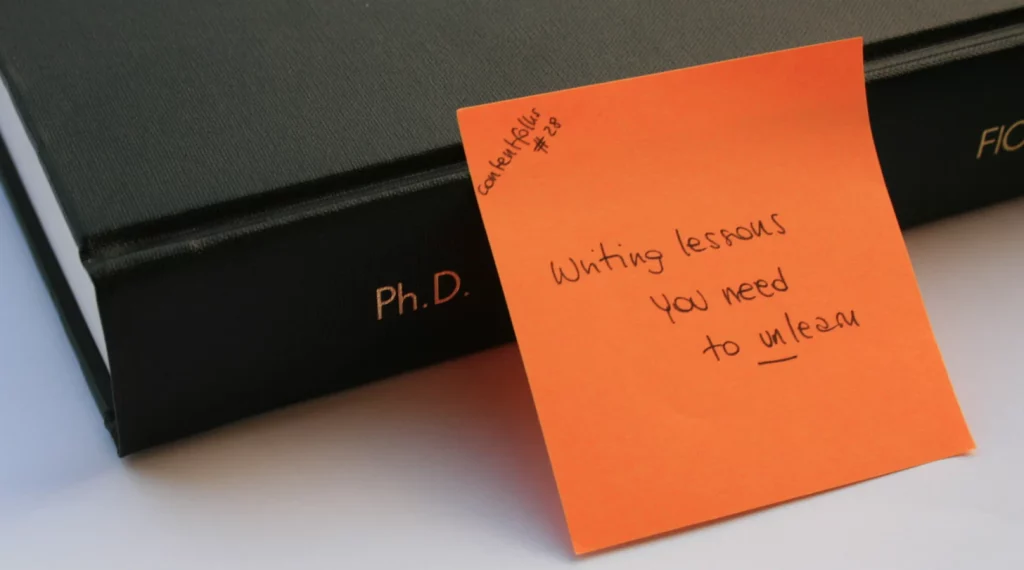
Welcome to contentfolks—a fortnightly newsletter with short lessons & ideas about content that makes a difference, sparks action, and truly serves its audience. Thank you for being here!
Hey 👋
8 years ago this week I defended my PhD thesis: an 87,000-word document I’d meticulously researched, written, and edited over the previous 4 years.
You’d think spending that long on one piece of content made it close to perfect, but I re-read some of it at the weekend and wow is it bad. It feels like a never-ending version of those blog posts, homepages, ad/or landing pages that leave you wondering “Okay, but what does this company/product actually do?”
Which brings me to:
The writing we learn in school will NOT make us great content marketers
Shortly after starting our content marketing careers, we start unlearning some writing lessons and bad habits we picked up in school.
What formal education generally teaches and rewards:
- Big words
- Complex sentences
- Quantity
- Adherence to rules, e.g. “do not start a sentence with and or but”
In contrast, great content marketers (and great communicators in general):
- Use simple language
- Write clear sentences
- Get to the core of a message quickly
- Break the rules to add clarity
But on top of that, they also know they must empathise with the audience, can think strategically, understand persuasion techniques, plus a whole lot of other things we were NOT taught and have to pick up on the job.
💡 A practical example of what NOT to do 💡
Here is an example of what I once honestly thought was advanced writing.
Behold an early summary of my doctoral thesis, circa 2009 (if it’s too small to read, click on it and it will open in a new tab in all its glory):

What’s wrong with it? How about everything 🤦♀️ These eight lines are convoluted and confusing, overuse big words and complex syntax to project competence, and go on forever without saying anything of substance. Also, I guarantee I never once stopped to think about the audience.
It’s common to make the same mistakes at work. It doesn’t matter if you’re writing an email, a blog post, or a memo for your team: opaque writing is often what we default to because A) it’s what we know, and B) it’s faster and easier than learning to distil your thoughts, cut the fluff, empathise with the audience, and be a relentless editor of your work.
💡 A practical example of what to do instead 💡
Let’s say you find yourself in need of a rapid unlearning curve. Here is a useful exercise: once the first draft of whatever you’re writing is ready, give yourself random artificial constraints, such as ‘now say the same thing in 75 words or less’ or ‘cut down the word count by 30%.’
The point is to get closer to the core of your message. For example, here I gave myself a 60-word limit (the original was 104):

It’s an obvious improvement, but it took me ~50 minutes and 30+ attempts to get to the bottom of what this thesis was about and re-jig the two sentences accordingly. I said it was a useful exercise, I never said it was going to be easy or quick 😇
But my main point is: it’s easy to be complex, it’s much harder to be clear.
Remember this, and course-correct accordingly.
Around the same time I wrote that horrible thesis summary, the US signed the Plain Writing Act of 2010, requiring federal agencies to use clear communication the public can understand. I often wish more marketers & writers knew about the 118-page companion booklet, because it’s a fabulous resource full of useful tips for making writing accessible.
Will you take a look?
